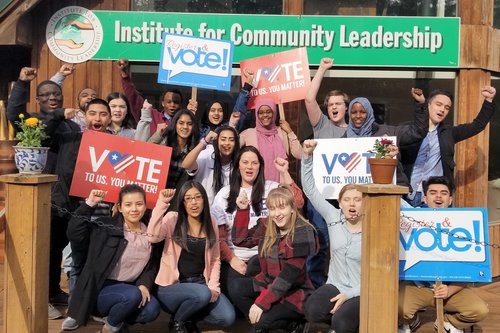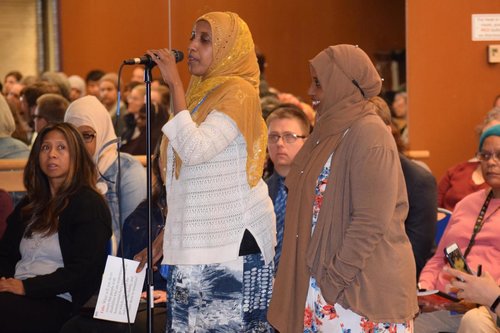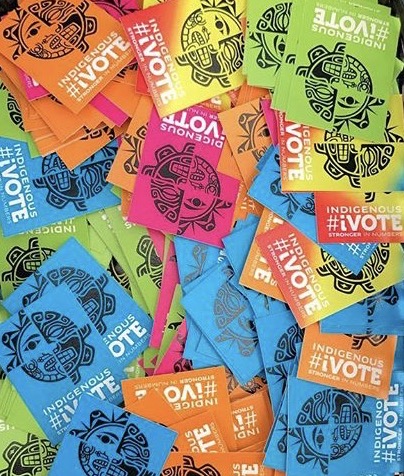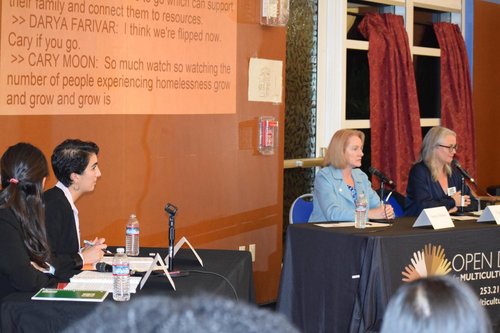King County, Washington Invests in Voter Education Fund
This story was featured in our ELECTricity newsletter in August 2019. Sign up to receive more success stories from election offices across the country. And how is your election office using technology to run excellent elections? Tell us about it by emailing [email protected] — we’d love to share your story!
Nobody knows your voters better than you do. Voters are idiosyncratic — they differ state to state, sometimes even jurisdiction to jurisdiction, and you’re the expert on yours. You know when, where, and how they like to vote. You know which precincts are popular after lunchtime, and which see a last-minute surge before closing. You can even predict which precincts will have higher turnout.
But that means you can predict lower turnout. You know which precincts are sleepier, which demographics vote at a lower rate, which communities aren’t engaged in the democratic process. You know who is falling through the cracks. But you don’t know how to reach them, or you would’ve done it already.
That’s why the elections office in King County, Washington partners with community-based organizations that are already known and trusted by the communities they serve. Through the Voter Education Fund, a fund managed jointly by King County Elections and the Seattle Foundation, these organizations receive grant money to improve voter access. The results are fantastic — in 2018, they collectively reached more than 84,000 people.

Engaging Underserved Communities
King County is home to 1.3 million registered voters, making it the 13th-most populous county in the U.S. The Elections department is staffed by ~70 full-time employees and serves nearly one third of Washington’s voters. The county is incredibly diverse, rich with people from all walks of life, and the Voter Education Fund helps engage these diverse communities.
The Fund was created in 2016 shortly after Julie Wise became the King County Director of Elections. “One thing we knew,” Julie says, “was that we didn’t know the best way to work with each of King County’s MANY communities.” Instead of reinventing the wheel, Julie and her team partnered with existing organizations that intimately understood the communities they represented. They’d “been doing this kind of work for decades,” Julie explains. “The right way to do this was to resource them and augment their impact.”
For the 2019-2020 cycle, the Voter Education Fund awarded nearly a million dollars — $950,000 — to 39 organizations working to improve voter access in communities that typically participate at a lower level. The list of grantees is extensive, reaching many kinds of voters: people with disabilities, communities of color, limited-English speaking communities, LGBTQ residents, formerly incarcerated individuals, people experiencing homelessness, and more.

The grant recipients participate in a wide range of activities. They conduct voter education, register eligible voters, provide technical assistance (e.g., helping voters change their address or language preference), and host nonpartisan events that bring communities together to learn about what’s on the ballot. They conduct social media campaigns, create voter guides, and host candidate forums. For example, in 2017, a group that works with immigrant and refugee families, Open Doors, hosted a candidate forum for the Seattle mayor’s race. “The forum was packed,” Julie says, “and attendees were able to engage in multiple languages, making it accessible for voters who are often left out of traditional campaign events.”
Beyond conducting voter outreach and education, the community partners serve another valuable function: helping King County Elections improve. They provide feedback on barriers their communities are facing, and this feedback is integrated into how Julie administers elections. “They’ve provided us with insight on everything from locations for ballot drop boxes, to legislation we should be advocating for in Olympia, to how we should handle addresses for individuals experiencing homelessness.”
Designing the Voter Education Fund
The Voter Education Fund is jointly managed by King County Elections and the Seattle Foundation, and they contribute equally to the grant funding. Similarly, “the division of labor is split relatively equally,” Julie explains, “based on each organizations’ skills and areas of expertise.” The Seattle Foundation, already expert in grantmaking, handles the application and selection processes. King County Elections provides training and technical assistance to the organizations on an ongoing basis.
The Seattle Foundation was ramping up its work with underrepresented communities around the same time Julie was elected. “It was a natural partnership,” she says, since priorities were already aligned. Besides, a government, philanthropic, and community partnership has greater combined impact than they would have separately.

The first year, the focus was on limited-English speaking communities. “We have more than 170 languages spoken here,” Julie explains, “and about a quarter of our residents speak a language other than English at home.” The election team’s data, corroborated by accounts from community leaders, showed much lower levels of engagement among these potential voters. The elections team saw an opportunity: for the first time, voters could receive a ballot in Spanish or Korean. Though voters already could receive a ballot in Chinese and Vietnamese, the option was clearly under-utilized.
The results were fantastic. After investing $240,000 in 22 community organizations, they reached nearly 30,000 limited-English speaking voters, and the number of voters receiving their ballot in a language other than English increased by 62%.
The model clearly worked. “In year two we expanded the program to include any organization working with historically disenfranchised communities,” Julie says. Though the program’s scope is much broader now, each year a few communities are highlighted as priorities. “For example, in 2018 we emphasized outreach to individuals experiencing homelessness and those who have a past felony conviction. Those are the issues that we hear the most confusion about.”
For the current 2019-2020 cycle, the priority is serving South King County. “It’s where we continuously see lower turnout and lower voter registration rates,” Julie explains. “I’m very excited to see what some of our partners can accomplish.”
Equipping Grantees for Success
Community organizations already create impact in the communities they serve, and partnering with them can boost that impact even further. Beyond grant dollars, King County Elections provides ongoing training opportunities and support to the grant recipients.
All partners attend an initial one-day orientation that covers the program’s objectives, an overview of election topics, and available tools and resources. Moving forward, King County Elections offers monthly refresher trainings on topics like voter registration, election legislation, social media tools, data mining, and GIS.
Partners also check-in regularly. There are required mid- and end-of-cycle check-ins, as well as opportunities to check-in more frequently. “Each partner has a dedicated point-of-contact on our Language Services and Community Engagement team,” Julie says, and they have a monthly opportunity to ask questions, provide updates, and get any help they need.

In grantmaking, it’s important to balance guidance with trust. Partners have on-the-ground insight and know how to best engage their communities. “We’ve encouraged our partners to be creative in how they reach their community,” Julie says. “Yes, we do need to get people registered but we also need them to make their voice heard by voting.” Partners are free to design their own programming — sometimes it’s voter registration, but sometimes it’s a candidate forum, a ballot party, or a community-specific voter guide.
For similar reasons, the Voter Engagement Fund moved to a two-year cycle in 2019. Julie says this helps “provide stability for our partners so that they can really gear up for 2020.” In philanthropy it’s generally considered best practice to award multi-year grants, so grantees can focus on their work without diverting precious time and resources to fundraising. It also reduces the administrative burden for everyone.
“Another hurdle,” Julie says, “was making sure the grant process was accessible for all types of organizations. Some of our partners are large, established organizations with dedicated grant writers who can easily navigate the county’s complex insurance and contracting processes, but others are almost entirely volunteer-staffed.” After the first year, the Seattle Foundation took over all administrative responsibilities, which greatly streamlined the process. For example, grantees can now receive a check upfront instead of sending an invoice for services already provided.
Creating Your Own Voter Education Fund
You may be thinking, Well, sure, if I had a million extra dollars, I’d do that too. Julie hears this reaction frequently. “Undeniably, this work takes resources,” she admits. And it certainly helps if you partner with a foundation, but it isn’t necessary. “The reality is, I choose to prioritize this work,” she says. “It’s not an afterthought or a nice-to-have, it’s absolutely essential to our work as election officials.”
Her main advice is to start small and try a pilot project. Then, after you have some success, talk with your councilmembers or commissioners, or even a foundation, about opportunities to scale up.
“Our most important initial challenge was to secure on-going funding,” Julie says, “which we did in partnership with our county council in the 2017-2018 budget process.” She credits her county council for being “fantastic partners,” but it helps that they regularly heard from the community about the need for this work. “Your community partners can be great advocates.”
If you want to implement something similar and have questions for King County, you can reach their office at [email protected].
And remember, even if you can’t offer funding to community organizations, they can still be valuable allies. Add them to your advisory board, or provide free trainings, or set up a voter registration booth at their events. Even informal conversations with community leaders can give you insight into what your voters need.
How have you improved voter access in your community? Tell us about your experience by emailing [email protected].